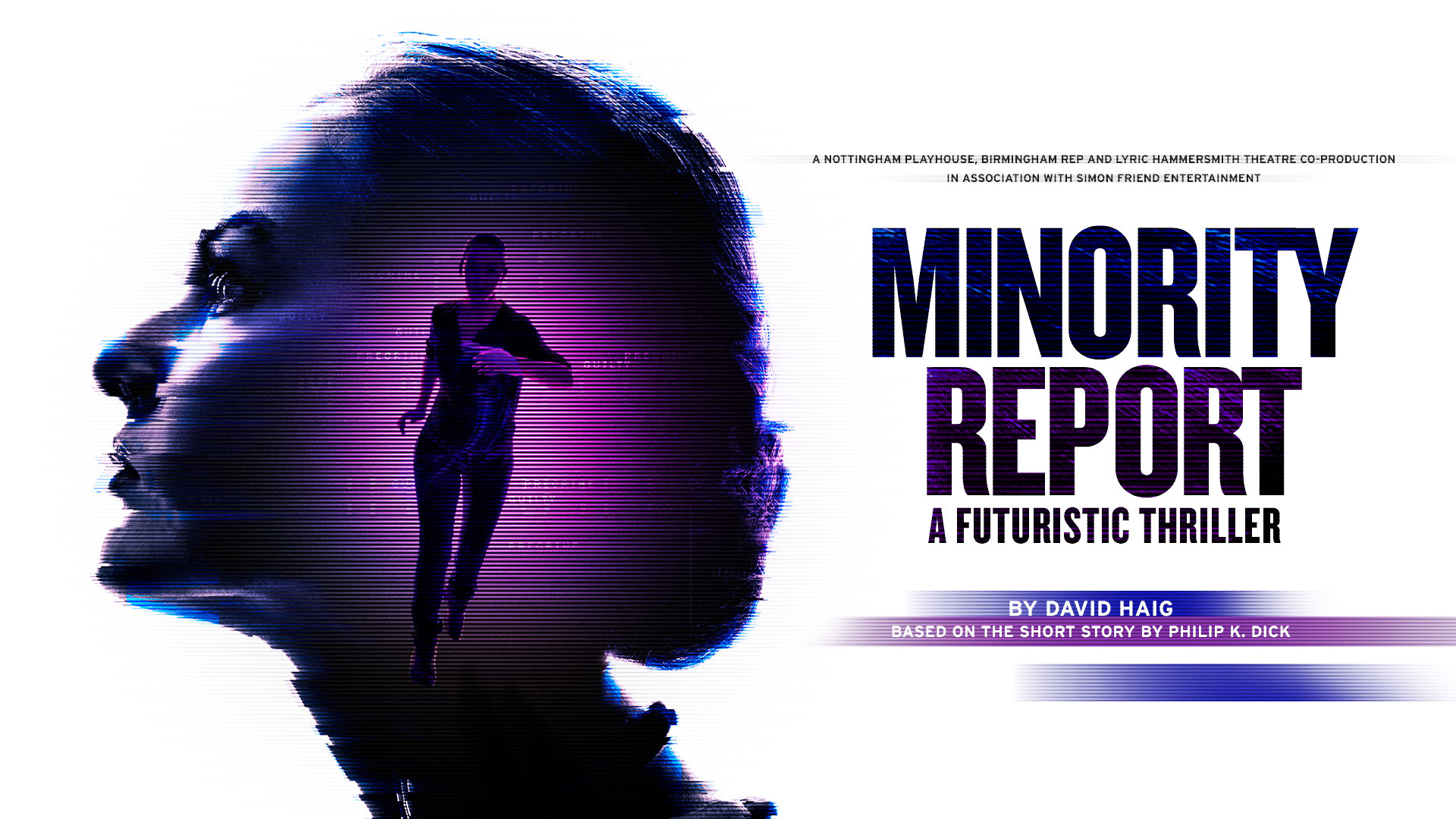Play review by Cliff Homewood
Currently showing at the Lyric Hammersmith
Who’s the best SF short story writer of all time? My first thought was Philip K Dick, the most imaginative, but then Ray Bradbury is the most lyrical and Harlan Ellison the most passionate. But Philip K Dick feels the most clever. I am often impressed by his various interpretations of reality, his stories warping your worldview. Minority Report’s one of the best, it’s clever how our understanding of the function of the precogs twists and changes through the story. Whilst I enjoyed the Spielberg adaptation, I was disappointed he dumbed down. The reality being that Philip K Dick looked at the world in a fundamentally different way than Spielberg, his was dark and paranoid, drug addled, believing the FBI were following him. Spielberg seems to view the world more cosily, like 50’s homespun homilies. We see his sentimentality in things like his ending of War of the Worlds, everyone lives happily ever after. Philip K Dick did not live in that world and nor do I, so I was disappointed when the film ended more in line with that ethos. It felt like a portrayal of the short story and I was hoping this play would do better.
I do believe you should review art by what it is, not what it isn’t. What it isn’t is bringing preconceived ideas to what the piece should be. Thus my reviews often delve into what the makers ideas were about the work:
 “The Philip K Dick estate have been incredibly generous and said that, as long as you use the basic premise of Pre-Crime, i.e. that you can anticipate murder and get criminals off the street before they’ve even committed the crime, you can have complete freedom to write exactly what you want,” states David Haig, writer of the play. “That was the very reason to do it. How incredibly exciting to go off-piste and just write exactly what came into my head on the basis of this short story written in the fifties.”
“The Philip K Dick estate have been incredibly generous and said that, as long as you use the basic premise of Pre-Crime, i.e. that you can anticipate murder and get criminals off the street before they’ve even committed the crime, you can have complete freedom to write exactly what you want,” states David Haig, writer of the play. “That was the very reason to do it. How incredibly exciting to go off-piste and just write exactly what came into my head on the basis of this short story written in the fifties.”
This is a fundamentally different approach to mine. I went to see Minority Report wanting to be impressed by Dick’s intelligence. It’s an ingenious story. This is not, its ideas felt hackneyed. It feels like an exploitation. The idea behind this play is that you get a chip in your head to prevent more serious impulses. A not-new idea in the world of SF, there was ‘capping’ for instance in The Tripods, and A Clockwork Orange explored the idea that if you limit one’s experience it limits the enjoyment of good as well as bad (an enjoyment of classical music in A Clockwork Orange’s case as it had been paired with the images of his conditioning.) But Philip K Dick’s Minority Report was about predeterminism meaning the removal of free will.
 The show starts with the lead character, now a woman, Julia Anderton, giving a speech to the audience. You don’t meet the precogs in the play, seemingly only mentioned due to the title. Its impressive visuals reminding me of The Curious Incident of the Dog in the Night-Time theatrical adaptation with a grid type set. Very modern looking, fitting perfectly with the film. It can be lit and utilised in various ways in line with the story, but in standard structure looked like skyscrapers. Holograms were portrayed via a see-through screen that two dimensional images could be cast onto. There was a car chase that felt a bit odd (the car just went from left to right on the stage) but kudos to the production for trying.
The show starts with the lead character, now a woman, Julia Anderton, giving a speech to the audience. You don’t meet the precogs in the play, seemingly only mentioned due to the title. Its impressive visuals reminding me of The Curious Incident of the Dog in the Night-Time theatrical adaptation with a grid type set. Very modern looking, fitting perfectly with the film. It can be lit and utilised in various ways in line with the story, but in standard structure looked like skyscrapers. Holograms were portrayed via a see-through screen that two dimensional images could be cast onto. There was a car chase that felt a bit odd (the car just went from left to right on the stage) but kudos to the production for trying.
You are better off going to see the superb Back to the Future show, which also has great visuals but stays faithful to the original work, down to restaging the van in the parking lot. It’s a shame Minority Report’s staging is let down by a playwright thinking he knows Dick. It seems presumptuous to take his tale’s name to tell one of your own. You have to be bloody good to be able to rewrite Dick and retain the quality, and this felt more generic. Although the 2017 TV series Electric Dreams similarly reinterpreted Dick, but more successfully. It doesn’t help that referring to it as a fifties story appears to be showing disdain whereas it holds up today. Filling your story with topical buzzwords like AI and Brexit may get a titter but is the parochial kind of thinking that dates your work which Philip K Dick avoided and thus his stories are still with us nearly 50 years after his death.
 I’m not the only one unimpressed:
I’m not the only one unimpressed:
“After this experience, anyone could be forgiven for feeling a little aggressive. I’ve certainly surrendered some neurons of my own.” A great end line from the good review at The Arts Desk. The Guardian ended with “The 3D set unmatched by its hollow 2D drama.”
Less Minority Report more Childlike Outline. Even the Souvenir Programme failed to deliver. 35 pages, and just three of them talking about the play. The rest advertising the cast and the theatre. Less presentation and more structure next time please. Minority Report is meant to be about free will and thus people can choose not to see it.


